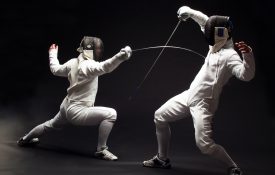-
Here’s How Many Calories You’ll Eat During the Super Bowl
TIME: The game lasts four hours, but what you eat will stick with you way longer than that. By some (admittedly unscientific) estimates, Americans who snack on typical Super Bowl fare, like pizza, beer, soda, chips, dips, hot wings and nachos, could take in as many as 2,400 calories and 121 grams of fat just during the game. ... Add on a few miles if you happen to root for the team that loses. A 2013 study in the journal Psychological Science found that on the Monday after a big football game, people who had cheered for the team that lost ate 16% more saturated fat than they usually did.
-

We Dislike Hypocrites Because They Deceive Us
We’re averse to hypocrites because their disavowal of bad behavior sends a false signal, misleading us into thinking they’re virtuous when they’re not, findings from a psychological study show.
-

People Are Surprisingly Bad at Knowing Who Their Rivals Are
New research suggests that we’re much better at knowing who likes us than who is competing against us at work.
-
White fear of demographic change is a powerful psychological force
VOX: In August 2008, the Census Bureau released a report that predicted a seismic shift in American demographics: By 2050, minorities would make up more than 50 percent of the population and become the majority. When Yale psychologist Jennifer Richeson heard about the report on NPR, she remembers thinking, “This is probably freaking somebody out.” By “somebody,” she means white people. Richeson’s studies on interracial interactions had taught her that when people are in the majority, the sense of their race is dormant. But the prospect of being in the minority can suddenly make white identity — and all the historical privilege that comes with it — salient.
-
Does Corruption Happen Slowly, or All at Once?
The Atlantic: If someone’s about to go into a cold swimming pool, they’ll probably use one of two tactics. They might dip a toe in, wade in to the ankles, and slowly, slowly inch their body into the water until they’re completely submerged. Or they’ll just cannonball in, and get it over with. If it’s not a cold swimming pool someone is entering, but rather the icy waters of corruption, which of these two strategies will they choose? Many would say the first; corruption is often characterized as a “slippery slope,” something into which a person or organization slowly descends as more and more small immoral acts add up.
-
Why parenting tweenage children is more stressful than the terrible twos
Independent: The exhausted, sleep-deprived mothers of babies and toddlers may appear to be grappling with the most stressful period of their child's lives, but experts believe it is in fact the 'perfect storm' of the tween years that cause the most grief. US researchers recently studied over 2,200 mothers who were parenting children ranging from infants to adults. The team investigated factors including the mothers’ personal wellbeing, parenting style and perceptions of their children. Read the whole story: Independent

